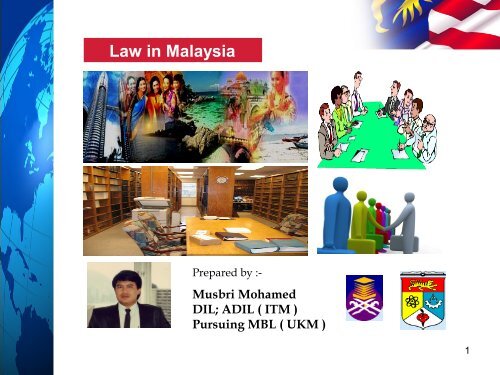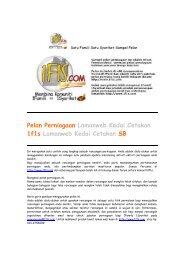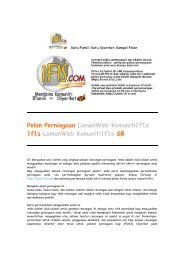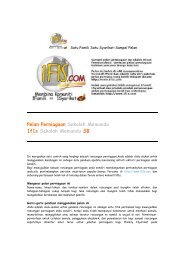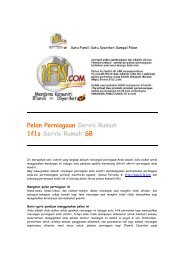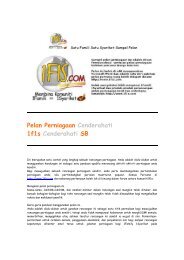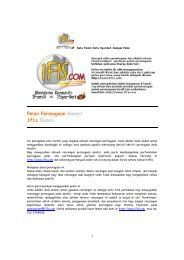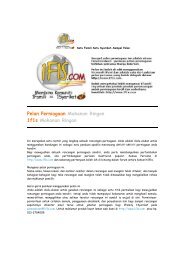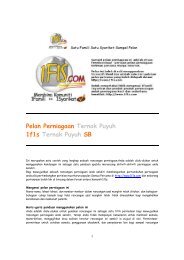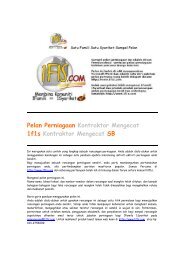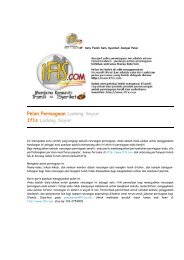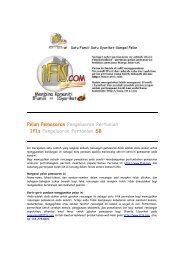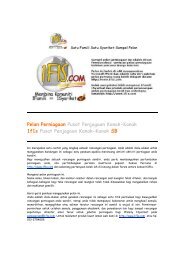Law in Malaysia
Law in Malaysia
Law in Malaysia
You also want an ePaper? Increase the reach of your titles
YUMPU automatically turns print PDFs into web optimized ePapers that Google loves.
<strong>Law</strong> <strong>in</strong> <strong>Malaysia</strong><br />
Prepared by :-<br />
Musbri Mohamed<br />
DIL; ADIL ( ITM )<br />
Pursu<strong>in</strong>g MBL ( UKM )<br />
1
What are Your<br />
Rights ?<br />
People have to know their scope of rights and<br />
freedom granted to them by government and must<br />
be able to demand for their rights whenever<br />
<strong>in</strong>justice takes place.<br />
2
<strong>Law</strong> protects basic <strong>in</strong>dividual rights and freedom such as liberty,<br />
equality and freedom of speech. It prevents <strong>in</strong>dividuals <strong>in</strong> powerful<br />
position from tak<strong>in</strong>g an unfair advantage of other people.<br />
<strong>Law</strong> ensures a safe and peaceful society, <strong>in</strong> which <strong>in</strong>dividual rights<br />
are preserved. Certa<strong>in</strong> governments have cruel laws, where police<br />
and armies arrests and punishes people without a trial <strong>in</strong> the court.<br />
<strong>Law</strong> applies to every persons, public authorities, governmental<br />
departments, private bodies, profit mak<strong>in</strong>g organizations as well as<br />
non-governmental organizations.<br />
3
In <strong>Malaysia</strong>, the legislative body which is made up of Lower<br />
House and the Upper house, both which consists of<br />
representatives of people, makes law.<br />
The executive body which is headed by YDPA, who is assisted by<br />
Prime M<strong>in</strong>ister, enforces the law, so that everyone will follow.<br />
The judiciary body judges law.<br />
These three bodies form the <strong>Malaysia</strong>n government.<br />
The law, however, is an <strong>in</strong>dependent entity by itself although it is<br />
made, enforced and judged by the government.<br />
4
<strong>Malaysia</strong>n sources of law comprises laws that have<br />
emerged from three significant periods.<br />
The <strong>Malaysia</strong>n history orig<strong>in</strong>at<strong>in</strong>g from :-<br />
1.Malacca Sultanate to spread of Islamic religion to<br />
Malacca<br />
2. South East <strong>Malaysia</strong><br />
3. And f<strong>in</strong>ally the colonial rule of British over the<br />
Malayan land which led to the sources of <strong>Malaysia</strong>n as<br />
can be seen today.<br />
5
The source of <strong>Malaysia</strong>n law<br />
can be classified <strong>in</strong>to :-<br />
1.Written law,<br />
2.Unwritten law, and<br />
3.Muslim law.<br />
6
The laws of <strong>Malaysia</strong> can be divided <strong>in</strong>to two types of laws—<br />
written law and unwritten law.<br />
Written laws are laws which have been enacted <strong>in</strong> the<br />
constitution or <strong>in</strong> legislations.<br />
Unwritten laws are laws which are not conta<strong>in</strong>ed <strong>in</strong> any<br />
statutes and can be found <strong>in</strong> case decisions. This is known as<br />
the common law or case law . In situations where there is no<br />
law govern<strong>in</strong>g a particular circumstance, <strong>Malaysia</strong>n case law<br />
may apply. If there is no <strong>Malaysia</strong>n case law, English case law<br />
can be applied. There are <strong>in</strong>stances where Australian, Indian,<br />
and S<strong>in</strong>gaporean cases are used as persuasive authorities.<br />
7
Written law is the law written and<br />
gazetted to be followed by the<br />
<strong>in</strong>dividuals of a State.<br />
It is made up of :-<br />
Federal constitution,<br />
State constitutions,<br />
Legislations, and<br />
Subsidiary legislations.<br />
8
Federal Constitution is said to be the highest legal authority of<br />
land.<br />
The Constitution was drafted by the Reid Commission <strong>in</strong> 1956 with<br />
5 representatives from India, British, Pakistan and Australia.<br />
The Constitution came <strong>in</strong>to force follow<strong>in</strong>g the <strong>in</strong>dependence on<br />
August 31, 1957. It consists of 15 Parts, 183 Articles and 13<br />
Schedules.<br />
Article 4(1) state that the constitution is the supreme law of the<br />
federation and any law passed after Merdeka Day which is<br />
<strong>in</strong>consistent with this constitution shall, to the maximum extent of<br />
<strong>in</strong>consistency, be void.<br />
9
Article 159 and 161E provides<br />
provisions to allow the constitution<br />
to be amended with the condition of<br />
2/3rds majority <strong>in</strong> both houses of<br />
Parliament agree<strong>in</strong>g to the<br />
amendment.<br />
10
State Constitution is the same as Federal<br />
Constitution, except it is set by the states <strong>in</strong><br />
<strong>Malaysia</strong>. The 8th schedule of the Federal<br />
Constitution mentions certa<strong>in</strong> provisions that are to<br />
be <strong>in</strong>cluded <strong>in</strong> the State Constitutions such as state<br />
executive members, f<strong>in</strong>ance, the state legislative<br />
assembly, roles of the Sultan or Yang di-Pertua<br />
Negeri, and etc. Article 71 mentions that all state<br />
constitutions must conta<strong>in</strong> their provisions,<br />
otherwise the Parliament can enforce those<br />
provisions or abolish any provision <strong>in</strong> the state<br />
constitution that contradict with those provisions.<br />
11
Legislations are the laws that are established by the<br />
Parliaments at federal level and by the State<br />
Legislative Assemblies at the state level. In<br />
<strong>Malaysia</strong>, the legislative gets its authority from the<br />
Federal Constitution. It mentions the scope of the<br />
Parliament and the State Assembly.<br />
If the Parliament (or any State Assembly) makes a<br />
law which is not <strong>in</strong> its scope of authority or<br />
contradicts with the constitution, the courts can<br />
declare that as null and void.<br />
12
Article 74 of Federal Constitution states that parliament<br />
may make law with referr<strong>in</strong>g to matters provided <strong>in</strong> the<br />
federal list and state legislatives may make law with<br />
referr<strong>in</strong>g to matter provided <strong>in</strong> the state list. Concurrent<br />
list is <strong>in</strong> the scope of enactment by both parliament and<br />
state legislatives. State list, federal list and the concurrent<br />
list are conta<strong>in</strong>ed <strong>in</strong> the N<strong>in</strong>th Schedule of Federal<br />
Constitution.<br />
If there are any contradictions between federal and state<br />
laws, the federal law shall prevail and state law is void to<br />
the scope of <strong>in</strong>consistency. This was provided by Article<br />
75 of Federal Constitution.<br />
13
Parliament may pass the power to legislate any subsidiary legislation<br />
dur<strong>in</strong>g emergency, even if there are any contradictions with the Federal<br />
Constitutions <strong>in</strong>volved, due to some exception <strong>in</strong> Article 150 of Federal<br />
Constitution.<br />
The related case is<br />
Eng Keock Cheng v. Public Prosecutor.<br />
In this case, Eng Keock Cheng who was convicted committed 2 offences<br />
dur<strong>in</strong>g emergency period and was ordered to put to death. He appealed on<br />
the ground that there were neither a prelim<strong>in</strong>ary enquiry nor a jury<br />
adopted by High Court which were required under Crim<strong>in</strong>al Procedure<br />
Act and claimed that the procedures set out <strong>in</strong> Emergency (Crim<strong>in</strong>al Trial)<br />
Regulations 1964 was <strong>in</strong>valid as it contradicts with Article 8 of Federal<br />
Constitution.<br />
It was held that Parliament may pass the power to legislate any subsidiary<br />
legislation dur<strong>in</strong>g emergency, even if there are any contradictions with the<br />
Federal Constitutions <strong>in</strong>volved, due to some exception <strong>in</strong> Article 150 of<br />
Federal Constitution. The appeal was dismissed.<br />
14
Unwritten laws are laws that are not enacted and not found <strong>in</strong><br />
any constitution. It comprises of English law (Common <strong>Law</strong> and<br />
Equity), judicial decisions and customs.<br />
Common <strong>Law</strong> is a major part of many States, especially<br />
Commonwealth countries. It is ma<strong>in</strong>ly made up of non –<br />
statutory laws, which are the precedents derived from<br />
judgments given on real cases by judges.<br />
<strong>Law</strong> of Equity resolves disputes between persons by referr<strong>in</strong>g to<br />
pr<strong>in</strong>ciples of fairness, equality and justness. In these cases,<br />
noth<strong>in</strong>g was done aga<strong>in</strong>st the law by the parties to dispute, but<br />
their rights are <strong>in</strong> conflict. Thus, it is different from law; both the<br />
Statutory <strong>Law</strong> enacted by Parliament and State Legislatives and<br />
Common <strong>Law</strong> which consists of precedents and op<strong>in</strong>ions given<br />
on real cases by judges.<br />
15
Section 3(1)(a) Civil <strong>Law</strong> Act 1956 states<br />
that courts <strong>in</strong> Pen<strong>in</strong>sular <strong>Malaysia</strong> should<br />
apply Common <strong>Law</strong> and the <strong>Law</strong> of Equity<br />
as adm<strong>in</strong>istered <strong>in</strong> England on 7th April<br />
1956.<br />
Section 3(1)(b) and Section 3(1)(c) of Civil<br />
<strong>Law</strong> Act 1956 states that courts <strong>in</strong> Sabah<br />
and Sarawak should apply common law<br />
and law of equity together with the statutes<br />
of general application as adm<strong>in</strong>istered <strong>in</strong><br />
England on 1st December 1951 and 12th<br />
December 1949 accord<strong>in</strong>gly.<br />
16
But it is not stated that the Common <strong>Law</strong> and<br />
<strong>Law</strong> of Equity <strong>in</strong> <strong>Malaysia</strong> should rema<strong>in</strong><br />
unmodified and follow the same law as<br />
adm<strong>in</strong>istered <strong>in</strong> England.<br />
Common law and law of equity <strong>in</strong> <strong>Malaysia</strong><br />
should be developed and amended accord<strong>in</strong>g to<br />
the local needs. In addition, these two laws<br />
should also take <strong>in</strong>to account of changes <strong>in</strong> these<br />
laws <strong>in</strong> England.<br />
However, <strong>Malaysia</strong>n government can set their<br />
own scope for the amended or repealed Common<br />
<strong>Law</strong> and <strong>Law</strong> of Equity <strong>in</strong> <strong>Malaysia</strong>.<br />
17
In the case Commonwealth of<br />
Australia v. Midford (<strong>Malaysia</strong>) Sdn.<br />
Bhd.,<br />
it was held that the doctr<strong>in</strong>e of<br />
sovereign or crown immunity which<br />
was developed <strong>in</strong> English Common<br />
<strong>Law</strong> after 1956 should apply <strong>in</strong><br />
<strong>Malaysia</strong>. It was said that any<br />
developments <strong>in</strong> English Common <strong>Law</strong><br />
after 1956 should apply <strong>in</strong> <strong>Malaysia</strong>.<br />
18
In the case<br />
Smith Kl<strong>in</strong>e & French Laboratories Ltd. v. Salim (<strong>Malaysia</strong>) Sdn.<br />
Bhd.,<br />
It was held that the courts have the authority to put aside any<br />
Common <strong>Law</strong> or <strong>Law</strong> of Equity which cannot be applied <strong>in</strong><br />
<strong>Malaysia</strong>.<br />
In the case<br />
Jamil b<strong>in</strong> Harun v. Yang Kamsiah & Another,<br />
It was decided that courts have the authority to decide whether to<br />
follow English <strong>Law</strong> (common law and law of equity) or Federal<br />
law, consider<strong>in</strong>g the circumstances and the scope the written law<br />
permits to do so.<br />
In the case Karpal S<strong>in</strong>gh v. Public Prosecutor,<br />
It was held that the crim<strong>in</strong>al offences <strong>in</strong> <strong>Malaysia</strong> were provided by<br />
Crim<strong>in</strong>al Procedure Code of <strong>Malaysia</strong> and therefore, there is no<br />
allowance for English law to apply.<br />
There are certa<strong>in</strong> boundaries as to the application of Common <strong>Law</strong><br />
and <strong>Law</strong> of Equity <strong>in</strong> <strong>Malaysia</strong>.<br />
19
Common law can apply <strong>in</strong> the absence of local<br />
legislation. Local law is regarded highly that the<br />
English law. The English law is only meant to fill <strong>in</strong><br />
the lacuna, <strong>in</strong> which the local legislation is not<br />
present.<br />
Only the relevant part which is suited to the local<br />
needs and circumstances applies. <strong>Malaysia</strong> is made<br />
up of different races, each possess<strong>in</strong>g their own<br />
customs, different from English law. The entire<br />
importation of English law means that the<br />
sovereignty of local race is affected.<br />
20
The case law related to the boundaries of application<br />
is,Syarikat Batu S<strong>in</strong>ar Sdn. Bhd. v. UMBC F<strong>in</strong>ance Bhd.<br />
In this case, problem of double f<strong>in</strong>anc<strong>in</strong>g occurred when<br />
first purchaser’s (UMBC F<strong>in</strong>ance Bhd.) <strong>in</strong>dorsement of<br />
ownership claim was not <strong>in</strong>cluded <strong>in</strong> the registration card<br />
of vehicle. UMBC tried to repossess the vehicle. The<br />
pla<strong>in</strong>tiff sued UMBC, claim<strong>in</strong>g that defendants were not<br />
entitled to the vehicle.<br />
It was held that the English law requires the <strong>in</strong>dorsement of<br />
ownership claim <strong>in</strong> registration card, but the law <strong>in</strong><br />
Pen<strong>in</strong>sular <strong>Malaysia</strong> does not really require the<br />
<strong>in</strong>dorsement to be attached with the registration card of<br />
vehicle. The law regard<strong>in</strong>g the <strong>in</strong>dorsement of ownership<br />
claims <strong>in</strong> <strong>Malaysia</strong> which applies to the local circumstances<br />
has to be dist<strong>in</strong>guished from the English law.<br />
21
Two components of English law are English commercial<br />
law and English land law.<br />
English Commercial <strong>Law</strong> is provided by the section 5(1)<br />
and section 5(2) of Civil <strong>Law</strong> Act 1956. The pr<strong>in</strong>ciples of<br />
English commercial law apply <strong>in</strong> Pen<strong>in</strong>sular <strong>Malaysia</strong><br />
except Penang and Malacca <strong>in</strong> absence of local legislations<br />
– Section 5(1). This <strong>in</strong>cludes laws regard<strong>in</strong>g partnership,<br />
bank<strong>in</strong>g, pr<strong>in</strong>cipals and agents, life and <strong>in</strong>surance and so<br />
on. There is no entire dependence on English commercial<br />
law as only certa<strong>in</strong> pr<strong>in</strong>ciples apply and many local<br />
statutes have been <strong>in</strong>serted to the English Commercial<br />
<strong>Law</strong>.<br />
22
English Commercial <strong>Law</strong> applies <strong>in</strong> Penang,<br />
Malacca, Sabah and Sarawak as the law<br />
adm<strong>in</strong>istered <strong>in</strong> these states will be the same as<br />
law adm<strong>in</strong>istered <strong>in</strong> England, <strong>in</strong> the like case at<br />
correspond<strong>in</strong>g period – Section 5(2). These states<br />
are still dependant on the English Commercial<br />
<strong>Law</strong>.<br />
In the case Koon Thean Soong v. Tan Eng Nam, it<br />
was held that English law of partnership was<br />
<strong>in</strong>applicable as there is a local statute govern<strong>in</strong>g<br />
the partnership <strong>in</strong> <strong>Malaysia</strong>, which is Contract<br />
(Malay State) Ord<strong>in</strong>ance.<br />
23
As for the English Land <strong>Law</strong>, none of the English<br />
Land <strong>Law</strong> concern<strong>in</strong>g the tenure, conveyance,<br />
assurance of or succession to any estate, right or<br />
<strong>in</strong>terest there<strong>in</strong> applies <strong>in</strong> <strong>Malaysia</strong>. In <strong>Malaysia</strong>,<br />
National Land Code is the law that governs the<br />
land matters and there is no any allowance for<br />
English land law, unless the National land code<br />
applies it for the judicial comity.<br />
24
The case related is United Malayan Bank<strong>in</strong>g Coperation Bhd &<br />
Another v. Pemungut Hasil Tanah, Kota T<strong>in</strong>ggi. In this case, Johor<br />
State Authority transferred land to a proprietor with certa<strong>in</strong><br />
conditions and annual rent as consideration. The rent and penalties<br />
on arrear payments were not settled. Johor State Authority served a<br />
notice to forfeiture the land as the right of consequence of the<br />
offence. The appellant, Johor State Authority and the proprietor,<br />
appealed and they were granted relief aga<strong>in</strong>st forfeiture. Collector of<br />
Land revenue appealed to federal court and the appellants appealed<br />
to Privy Council.<br />
It was held that English land law concern<strong>in</strong>g the relief aga<strong>in</strong>st<br />
forfeiture is <strong>in</strong>applicable <strong>in</strong> <strong>Malaysia</strong>. Relief aga<strong>in</strong>st forfeiture means<br />
that order for forfeiture is cancelled and it was provided by<br />
<strong>Malaysia</strong>n National Land Code.<br />
25
Judicial decisions are based on ‘doctr<strong>in</strong>e of b<strong>in</strong>d<strong>in</strong>g precedent’.<br />
Precedents are the decisions made by judges previously <strong>in</strong> similar<br />
circumstances. There are two types of precedents.<br />
Mandatory precedent is applied when the decisions of superior court<br />
are b<strong>in</strong>d<strong>in</strong>g on lower courts or the superior courts are bound by their<br />
own decisions previously. However, the decisions of lower courts are<br />
not b<strong>in</strong>d<strong>in</strong>g over superior courts. The lower courts must refer to the<br />
mandatory precedents of superior courts. However, judge of superior<br />
court will dist<strong>in</strong>guish a case before him and the cases lay<strong>in</strong>g down the<br />
precedents and can decide not to follow the mandatory precedent if he<br />
th<strong>in</strong>ks that the mandatory precedent is not related to the case before<br />
him. From this, an orig<strong>in</strong>al precedent is formed.<br />
26
Persuasive precedent is a precedent which is<br />
useful or relevant to a case. It is not mandatory<br />
for the judges to apply persuasive precedent.<br />
Persuasive precedent may be b<strong>in</strong>d<strong>in</strong>g on lower<br />
courts if judges of superior court choose to<br />
apply persuasive precedent.<br />
27
Customs are another important source of<br />
unwritten law. Customs are <strong>in</strong>herited from one<br />
generation to another generation. Every race has<br />
its own customs. Ch<strong>in</strong>ese and H<strong>in</strong>dus customs<br />
are governed by Ch<strong>in</strong>ese and H<strong>in</strong>du Customary<br />
<strong>Law</strong>. Natives <strong>in</strong> Sabah and Sarawak have their<br />
own customary law which relates to the land<br />
and family matters. ‘Adat’ applies to malays.<br />
There are two types of Adat; Adat Perpatih and<br />
Adat Temenggung.<br />
28
Adat Perpatih applies <strong>in</strong> Negeri Sembilan and<br />
Nan<strong>in</strong>g <strong>in</strong> Malacca. The unique characteristic of<br />
Adat Perpatih is matril<strong>in</strong>eal form of<br />
organization. It concerns with matters such as<br />
land tenure, l<strong>in</strong>eage, <strong>in</strong>heritance and election of<br />
members of lembaga and YDP. Matril<strong>in</strong>eal is a<br />
system <strong>in</strong> which one belongs to mother's l<strong>in</strong>eage;<br />
it generally <strong>in</strong>volves the <strong>in</strong>heritance of property,<br />
names or titles from mother to daughters.<br />
29
Adat Temenggung applies <strong>in</strong> other states.<br />
It is based on the characteristic of<br />
patril<strong>in</strong>eal form of organization.<br />
Patril<strong>in</strong>eal is a system <strong>in</strong> which one<br />
belongs to father's l<strong>in</strong>eage; it generally<br />
<strong>in</strong>volves the <strong>in</strong>heritance of property,<br />
names or titles from father to sons.<br />
30
After the establishment of <strong>Law</strong> Reform<br />
(Marriage and Divorce) Act 1976, the family<br />
law has been given enforcement on matters of<br />
marriage, divorce and <strong>in</strong>heritance. As a result,<br />
the Ch<strong>in</strong>ese and H<strong>in</strong>du Customary <strong>Law</strong>s have<br />
lost its effect as an important source of<br />
unwritten law <strong>in</strong> <strong>Malaysia</strong>.<br />
31
Islamic law, which is only applicable to Muslims, is<br />
enacted under the Federal Constitution. The state<br />
legislatures have the power and are permitted to make<br />
Islamic laws perta<strong>in</strong><strong>in</strong>g to persons profess<strong>in</strong>g the Islam<br />
religion. Such laws are adm<strong>in</strong>istered by separate court<br />
system, Syariah Courts. State legislature also has the<br />
jurisdiction over the constitution, organization and<br />
procedures of Syariah Courts.<br />
Now, Islamic laws are <strong>in</strong>creas<strong>in</strong>gly applied <strong>in</strong> bank<strong>in</strong>g and<br />
land laws other than applied to family matters and estate<br />
matters. The YDPA is the head of Islam <strong>in</strong> his home state,<br />
Penang, Malacca, Sabah, Sarawak and Federal Territories.<br />
The head of Islam of other States is Sultan.<br />
32
Sections 3 and 5 of the Civil <strong>Law</strong> Act allows for the<br />
application of English common law, equity rules, and<br />
statutes <strong>in</strong> <strong>Malaysia</strong>n civil cases where no specific laws<br />
have been made.<br />
In 2007, the then Chief Justice of <strong>Malaysia</strong>,Tan Sri<br />
Ahmad Fairuz Abdul Halim questioned to need to<br />
resort to the English common law despite <strong>Malaysia</strong><br />
hav<strong>in</strong>g already been <strong>in</strong>dependent for 50 years and<br />
proposed to replace it with Islamic law jurisprudence or<br />
sharia law.<br />
33
The Federal Court of <strong>Malaysia</strong> is the highest judicial authority<br />
and the f<strong>in</strong>al court of appeal <strong>in</strong> <strong>Malaysia</strong>. The country,<br />
although federally constituted, has a s<strong>in</strong>gle-structured judicial<br />
system consist<strong>in</strong>g of two parts - the superior courts and the<br />
subord<strong>in</strong>ate courts. The subord<strong>in</strong>ate courts are the Magistrate<br />
Courts and the Sessions Courts whilst the superior courts are<br />
the two High Courts of co-ord<strong>in</strong>ate jurisdiction and status,<br />
one for Pen<strong>in</strong>sular <strong>Malaysia</strong> and the other for the States of<br />
Sabah and Sarawak, the Court of Appeal and the Federal<br />
Court. The Federal Court, earlier known as the Supreme<br />
Court and renamed the Federal Court vide Act A885 effective<br />
from June 24, 1994, stands at the apex of this pyramid.<br />
34
Before January 1, 1985, the Federal Court was the highest<br />
court <strong>in</strong> the country but its decisions were further<br />
appealable to the Privy Council <strong>in</strong> London. However on<br />
January 1, 1978, Privy Council appeals <strong>in</strong> crim<strong>in</strong>al and<br />
constitutional matters were abolished and on January 1,<br />
1985, all other appeals i.e. civil appeals except those filed<br />
before that date were abolished. The sett<strong>in</strong>g up of the Court<br />
of Appeal on June 24, 1994 after the Federal Constitution<br />
was amended vide Act A885 provides litigants one more<br />
opportunity to appeal. Alternatively it can be said that the<br />
right of appeal to the Privy Council is restored, albeit <strong>in</strong> the<br />
form of the Federal Court.<br />
35
<strong>Malaysia</strong> is a constitutional<br />
monarchy, nom<strong>in</strong>ally headed by the<br />
Yang di-Pertuan Agong ("paramount<br />
ruler"), customarily referred to as the<br />
k<strong>in</strong>g. K<strong>in</strong>gs are elected for 5-year<br />
terms from among the n<strong>in</strong>e sultans of<br />
the pen<strong>in</strong>sular <strong>Malaysia</strong>n states. The<br />
k<strong>in</strong>g also is the leader of the Islamic<br />
faith <strong>in</strong> <strong>Malaysia</strong>.<br />
36
Executive power is vested <strong>in</strong> the cab<strong>in</strong>et led by the<br />
Prime M<strong>in</strong>ister; the <strong>Malaysia</strong>n constitution<br />
stipulates that the prime m<strong>in</strong>ister must be a<br />
member of the lower house of parliament who, <strong>in</strong><br />
the op<strong>in</strong>ion of the Yang di-Pertuan Agong,<br />
commands a majority <strong>in</strong> parliament. The cab<strong>in</strong>et is<br />
chosen from among members of both houses of<br />
parliament and is responsible to that body.<br />
37
The Special Court was established on March 30,<br />
1993 vide Act A848, now provided for <strong>in</strong> Article<br />
182 of the Federal Constitution. All offences<br />
committed by the Rulers (the Rulers be<strong>in</strong>g the<br />
monarchical heads of the component states of the<br />
Federation of <strong>Malaysia</strong>) <strong>in</strong>clud<strong>in</strong>g His Majesty The<br />
Yang di-Pertuan Agong shall be heard by the<br />
Special Court. The Special Court shall also hear all<br />
civil cases by or aga<strong>in</strong>st them. This Court shall be<br />
chaired by the Chief Justice of the Federal Court<br />
and he shall be assisted by four other members,<br />
namely the two Chief Judges of the respective High<br />
Courts and two other persons appo<strong>in</strong>ted by the<br />
Conference of Rulers who hold or have held office<br />
as a judge.<br />
38
The states of Sabah and Sarawak jo<strong>in</strong>ed Malaya and<br />
S<strong>in</strong>gapore to form <strong>Malaysia</strong> <strong>in</strong> 1963, and there are<br />
special laws applicable only to these two states. An<br />
important area <strong>in</strong> this regard is the immigration law.<br />
Other areas of law peculiar to these two states is land<br />
law. Generally, land matters and natural resource<br />
management is a federal law matter. However, there<br />
are special provisions <strong>in</strong> the Constitution allow<strong>in</strong>g for<br />
the states of Sabah and Sarawak to create separate<br />
legislations. For example, <strong>in</strong> the Pen<strong>in</strong>sular, the<br />
National Land Code governs most of the laws relat<strong>in</strong>g to<br />
land. In Sabah, the ma<strong>in</strong> legislation is the Sabah Land<br />
Ord<strong>in</strong>ance; and <strong>in</strong> Sarawak, the Sarawak Land Code.<br />
39
The federal government has authority over<br />
external affairs, defense, <strong>in</strong>ternal security, justice<br />
(except civil law cases among Malays or other<br />
Muslims and other <strong>in</strong>digenous peoples,<br />
adjudicated under Islamic and traditional law),<br />
federal citizenship, f<strong>in</strong>ance, commerce, <strong>in</strong>dustry,<br />
communications, transportation, and other<br />
matters.<br />
40
<strong>Malaysia</strong> has an exemplary record of racial,<br />
cultural and religious tolerance.<br />
The document of dest<strong>in</strong>y that was adopted<br />
as the Constitution bore the mark of<br />
idealism as well as realism. It blended the<br />
old and the new, the <strong>in</strong>digenous and the<br />
imported.<br />
41
The ideas of Westm<strong>in</strong>ster and the experience of India<br />
m<strong>in</strong>gled with those of Malaya to produce a unique<br />
form of government. The Malay-Muslim features of<br />
the Constitution are balanced by other provisions<br />
suitable for a multi-racial and multi-religious society.<br />
42
Malay privileges are offset<br />
by safeguards for the <strong>in</strong>terest<br />
of other communities. The<br />
spirit that animates the<br />
Constitution is one of<br />
moderation, compassion and<br />
compromise.<br />
43
Courts of <strong>Malaysia</strong><br />
There are generally two types of trials,<br />
crim<strong>in</strong>al and civil. The hierarchy of courts<br />
beg<strong>in</strong>s from the Magistrates' Court,<br />
Sessions Court, High Court, Court of<br />
Appeal, and f<strong>in</strong>ally, the Federal Court.<br />
44
The jurisdiction of the courts <strong>in</strong> civil or<br />
crim<strong>in</strong>al matters are conta<strong>in</strong>ed <strong>in</strong> the<br />
Subord<strong>in</strong>ate Courts Act 1948 and the Courts<br />
of Judicature Act 1964.<br />
Article 121 of the Constitution provides for<br />
two High Courts of coord<strong>in</strong>ate jurisdiction,<br />
the High Court <strong>in</strong> Malaya, and the High<br />
Court <strong>in</strong> Sabah and Sarawak. Thus this creates<br />
two separate local jurisdiction of the courts –<br />
for Pen<strong>in</strong>sular <strong>Malaysia</strong> and for East<br />
<strong>Malaysia</strong>.<br />
45
The highest position <strong>in</strong> the judiciary of<br />
<strong>Malaysia</strong> is the Chief Justice of the Federal<br />
Court of <strong>Malaysia</strong> (also known as the Chief<br />
Justice of <strong>Malaysia</strong>), followed by the President<br />
of the Court of Appeal, the Chief Judge of<br />
Malaya, and the Chief Judge of Sabah and<br />
Sarawak.<br />
The superior courts are the High Court, Court<br />
of Appeal, and the Federal Court, while the<br />
Magistrates' Courts and the Sessions Courts<br />
are classified as subord<strong>in</strong>ate courts.<br />
46
The current President of the Federal Court is Justice<br />
Dato' Abdul Hamid Mohamad, the President of the<br />
Court of Appeal is Tan Sri Dato' Zaki b<strong>in</strong> Tun Azmi,<br />
and the Chief Judge of Malaya is Justice Dato'<br />
Alaudd<strong>in</strong> Mohamad Sheriff. The current Chief Judge<br />
of Sabah and Sarawak is Justice Tan Sri Richard<br />
Malanjum (appo<strong>in</strong>ted 2006).<br />
47
There is a parallel system of state Syariah<br />
Courts which has limited jurisdiction over<br />
matters of state Islamic ( sharia ) law. The<br />
Syariah Courts have jurisdiction only over<br />
matters <strong>in</strong>volv<strong>in</strong>g Muslims, and can generally<br />
only pass sentences of not more than three<br />
years imprisonment, a f<strong>in</strong>e of up to RM5,000,<br />
and/or up to six strokes of the cane.<br />
48
List of Chief Justices of the Federal Court<br />
Tun Abdul Hamid Omar 1994, previously Lord President<br />
Tun Mohamed Eusoff Ch<strong>in</strong> 1994 – 2000<br />
Tun Mohamed Dzaidd<strong>in</strong> Abdullah 2000 – 2003<br />
Tun Ahmad Fairuz Abdul Halim 2003 – 2007<br />
Datuk Abdul Hamid Mohamad 2007 - present<br />
49
The government and law should act <strong>in</strong> the <strong>in</strong>terest of<br />
society and these bodies should not stand dist<strong>in</strong>ctively<br />
from the society <strong>in</strong> order to ma<strong>in</strong>ta<strong>in</strong> peace and balance<br />
of power between people and government.<br />
50


